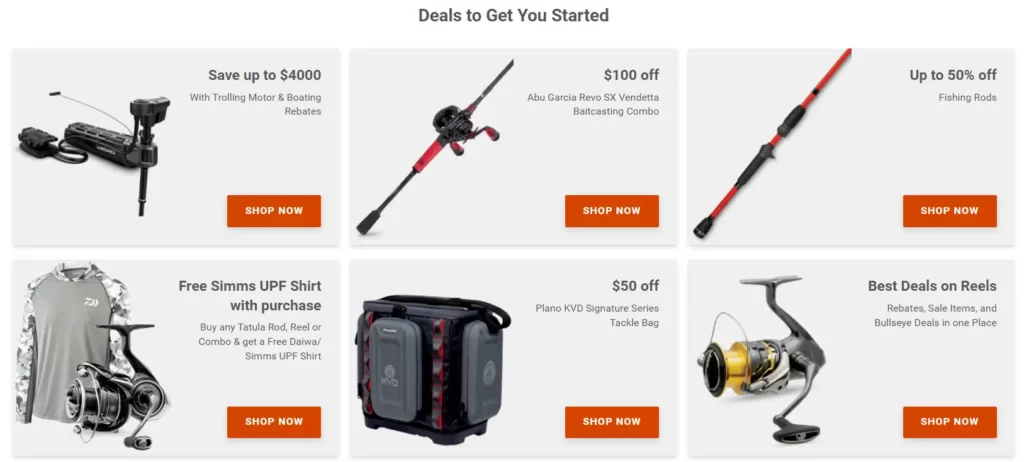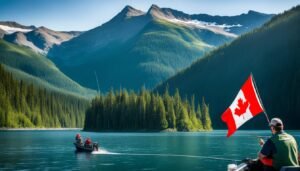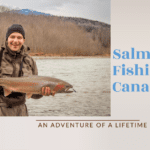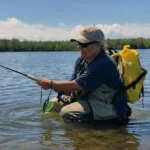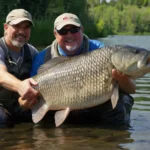Explore Canada's Ultimate Fishing, Hunting, and Wildlife Adventures

Get Your Canada Fishing License – Enjoy the Great Outdoors!
Key Takeaways
1. Fishing in Canada is popular due to its abundance of lakes, rivers, and streams.
2. Obtaining a fishing license is essential as it’s a legal requirement and supports wildlife conservation.
3. Different types of licenses are available, including recreational, conservation, disabled, and one-day licenses.
4. Fishing licenses can be obtained online or in person, and costs vary depending on the province and license type.
5. It’s crucial to follow fishing regulations, including fishing seasons, catch limits, and size restrictions, to ensure sustainable fishing practices.
Fishing is a beloved leisure activity in Canada, where the abundance of lakes, rivers, and streams offer a wide range of fishing opportunities. Before heading out to catch some fish, it’s essential to obtain a Canada fishing license.
A fishing license not only ensures that you’re complying with the regulations but also contributes to wildlife conservation and habitat protection.
Disclosure: When you purchase a service or a product through our links, we sometimes earn a commission, at no extra cost to you.
Table of Contents
Why Do You Need a Canada Fishing License?
If you plan on fishing in Canada, it is important to obtain a fishing license. Not only is it a legal requirement, but it also helps to support sustainable fishing practices and protect the environment for future generations to enjoy.
Each province in Canada has its own set of regulations, so it is important to familiarize yourself with the specific rules and requirements before venturing out on a fishing trip. This includes understanding the different types of licenses available, fishing seasons, bag limits, and size restrictions.
Why Obtain a Fishing License in Canada?
Obtaining a fishing license in Canada is not only a legal requirement, but it also helps to ensure that fishing is conducted in a sustainable and responsible manner. The fees collected from fishing licenses are often used to fund conservation projects and promote sustainable fishing practices.
Additionally, fishing licenses help to manage fish populations by regulating the number of fish that can be caught, the size of fish that can be kept, and the areas where fishing is permitted. By obtaining a fishing license, you are doing your part to protect Canada’s natural resources and preserve them for generations to come.
How to Obtain a Canada Fishing License
The process for obtaining a fishing license in Canada will depend on the province you plan on fishing in. Generally, licenses can be purchased online, in person at a government licensing office, or through a licensed vendor.
Before purchasing a fishing license, it is important to familiarize yourself with the specific fishing regulations in the province you plan on fishing in. This will ensure that you purchase the correct license and are able to fish in compliance with the rules.
Disclosure: When you purchase a service or a product through our links, we sometimes earn a commission, at no extra cost to you.
When applying for a fishing license, you will typically need to provide personal identification and proof of residency. The cost of a fishing license will vary depending on the province you plan on fishing in and the type of license you need.
Fishing Regulations in Canada
Each province in Canada has its own set of fishing regulations that must be followed. These regulations include fishing seasons, bag limits, and size restrictions for various fish species.
It is important to familiarize yourself with the specific fishing regulations in the province you plan on fishing in. Failure to adhere to these regulations can result in fines or other penalties.
Additionally, it is important to practice sustainable fishing practices, such as catch and release, to help protect fish populations and preserve Canada’s natural resources.
Different Types of Canada Fishing Licenses
If you’re planning to fish in Canada, it’s important to ensure that you have the right fishing license or permit for the province you’ll be fishing in. Here are some of the different types of Canada fishing licenses that you should be aware of:
| Type of License | Description |
|---|---|
| Recreational Fishing License | This is the most common type of fishing license and is required for all non-commercial fishing activities. |
| Conservation Fishing License | This license is available for those who want to practice “catch and release” fishing only. The fish caught must be returned to the water immediately. |
| Disabled Fishing License | This license is available to disabled individuals who are residents of Canada and have a valid fishing license. It allows for additional catch limits to accommodate for any physical limitations. |
| One-Day Fishing License | If you’re not an avid angler and plan on fishing for only one day, you can purchase a one-day fishing license, which is valid for the date specified on the license. |
It’s important to note that fishing licenses and permits are province-specific, so be sure to get the correct license for the province you’ll be fishing in. In some cases, you may need additional permits to fish in certain areas or for certain species.
Before setting out on your fishing trip, check with the local authorities or visit the government website of the province you’ll be fishing in to ensure you have all the necessary licenses and permits.
How to Purchase a Canada Fishing License Online
If you’re planning to fish in Canada, you’ll need to obtain a fishing license. Luckily, you can purchase a Canada fishing license online, making the process quick and convenient. Here is a step-by-step guide to help you through the process:
- Visit the Government of Canada website.
- Select the province or territory where you plan to fish.
- Choose your desired fishing license type, such as freshwater or saltwater.
- Select the duration of your license, whether it’s for a day, a week, or longer.
- Enter your personal information, such as your name, address, and date of birth.
- Review the terms and conditions of your license purchase.
- Provide payment information and confirm your purchase.
It’s important to note that you may need to provide additional documentation to obtain your fishing license, such as proof of residency or citizenship. However, the online purchasing system will provide clear instructions on what is required. Once you’ve completed your purchase, your fishing license will either be available for immediate download or will be mailed to you within a few weeks.
Purchasing a Canada fishing license online is not only convenient, but it also helps support conservation efforts and sustainable fishing practices in Canada. So why wait? Buy your fishing license today and get ready for an unforgettable fishing experience in the great outdoors!
Canada Fishing License Costs
Before you head out on your fishing adventure in Canada, it’s important to obtain the appropriate fishing license for the province you’ll be fishing in.
The cost of a Canada fishing license varies depending on a few factors, including the length of the license and the province in which you’ll be fishing.
Here’s a breakdown of the costs associated with obtaining a fishing license in Canada:
| Province | Length of License | Cost |
|---|---|---|
| Ontario | 1 year | $28.71 |
| Ontario | 3 year | $79.71 |
| Ontario | 7 day sport | $12.21 |
| British Columbia | 1 year | $36.00 |
| British Columbia | 5 day sport | $21.00 |
| Quebec | 1 year | $30.58 |
| Quebec | 7 day sport | $16.16 |
Note that these costs are subject to change, so it’s always a good idea to double-check the current fees before purchasing your license. Additionally, some provinces may charge additional fees for certain types of fishing, such as fly-fishing or ice fishing.
Keep in mind that the fees collected from fishing licenses are typically used to support conservation efforts to protect Canada’s fish and wildlife populations, so your license fees help contribute to the preservation of these resources for generations to come.
Fishing Seasons and Regulations in Canada
When planning a fishing trip in Canada, it is crucial to be aware of the fishing seasons and regulations in place. The government of Canada regulates fishing in federal waters, which includes the Great Lakes and most of Canada’s rivers.
However, individual provinces and territories also have their own regulations in place. It is important to understand the local fishing regulations to avoid any legal issues and ensure sustainable fishing practices.

Fishing Seasons in Canada
The fishing season in Canada varies depending on the species being targeted and the location. Generally, the fishing season starts in the spring and ends in the fall. However, some species, such as trout and salmon, have specific season dates that may differ from other fish.
It is important to check the fishing season dates in the area you plan to fish, as well as any restrictions on the number and size of fish that can be caught and kept. This information can usually be found on the provincial government’s website or by contacting the local fishing authorities.
Fishing Regulations in Canada
Fishing regulations in Canada are in place to protect the environment and promote sustainable fishing practices. These regulations cover areas such as catch limits, fishing gear restrictions, and conservation measures for certain species.
It is important to understand and follow these regulations to ensure that fishing remains a sustainable activity in Canada. Violating these regulations can result in penalties, fines, and even the suspension of fishing privileges.
The Importance of Sustainable Fishing
Sustainable fishing practices are crucial to protect the environment and maintain healthy fish populations. By following fishing regulations and being mindful of catch limits, anglers can help preserve fish populations for future generations.
It is also important to properly dispose of any fishing gear and avoid leaving behind any trash or debris. This can help keep waterways clean and protect the natural habitat of fish species.
By understanding and following fishing regulations, anglers can enjoy their favorite pastime while also contributing to the conservation of Canada’s natural resources.
Tips for a Successful Fishing Trip in Canada
If you’re planning a fishing trip in Canada, you’re in for a treat. The country is home to some of the best freshwater and saltwater fishing in the world. Here are some tips to help make your trip a success:
- Research Your Destination: Canada is a vast country with many different types of fishing opportunities. Research the area you’ll be visiting to determine what types of fish are available and the best time of year to catch them. This will help you choose the right gear and plan your trip accordingly.
- Invest in Quality Gear: Having the right gear can make all the difference in your fishing success. Invest in quality rods, reels, and line, and make sure to bring a variety of lures or bait.
- Choose the Right Fishing Spot: Consult with locals or guide services to find the best fishing spots in the area. Factors to consider include water depth, structure, and current.
- Practice Good Casting Technique: If you’re new to fishing or haven’t practiced in a while, take some time to brush up on your casting technique. This will help you target specific areas and increase your chances of catching fish.
- Be Respectful of Local Fishing Customs: Every region has its own unique fishing customs and etiquette. Take the time to learn about these customs and follow them to show respect for the local community and environment.
- Follow Fishing Regulations: Fishing regulations in Canada are in place to ensure sustainable practices and protect the environment. Make sure to obtain the necessary fishing licenses and adhere to local regulations.
- Enjoy the Experience: Fishing in Canada is not just about catching fish, it’s about enjoying the natural beauty of the country and spending time outdoors. Take the time to appreciate your surroundings and the experience of being in nature.
FAQ about Canada Fishing License
Here are some frequently asked questions related to obtaining a fishing license in Canada:
Do I need a fishing license to fish in Canada?
Yes, it is a legal requirement to obtain a fishing license before fishing in Canada. This applies to both residents and non-residents of Canada.
Where can I purchase a fishing license in Canada?
You can purchase a fishing license online through the government websites of the province you plan to fish in. Some provinces also offer in-person options at select locations such as government offices or authorized retailers.
What is the validity of a fishing license in Canada?
The validity of a fishing license varies depending on the province and type of license purchased. Typically, a license is valid for the current fishing season or calendar year. It is important to check the expiration date of the license before fishing to ensure compliance with regulations.
Are there any age restrictions to obtaining a fishing license in Canada?
Age requirements vary depending on the province. In most provinces, individuals under the age of 16 or 18 can fish without a license, but certain regulations may still apply. It is best to check with the relevant provincial authority before fishing.
What should I do if I lose my fishing license?
If you lose your fishing license, you should contact the relevant provincial authority as soon as possible. In some cases, a replacement license may be issued for a small fee.
Can I transfer my fishing license to another person?
No, fishing licenses are non-transferable and are only valid for the individual specified on the license.
What happens if I fish without a license in Canada?
Fishing without a license is a serious offense in Canada and can result in fines, confiscation of fishing equipment, and legal action. It is important to obtain the necessary license to ensure compliance with fishing regulations and protect the sustainability of Canada’s natural resources.
Can I Fish Without a License in Canada?
It is illegal to fish without a license in Canada. All individuals who engage in recreational fishing in Canada must obtain the necessary fishing license.
What are the consequences of fishing without a license in Canada?
The penalties for fishing without a license in Canada can vary by province, but fines can range from $100 to over $5000. Additionally, individuals may face the confiscation of their fishing equipment and legal action.
Are there any exceptions to fishing without a license in Canada?
There are a few exceptions to fishing without a license in Canada. For example, some provinces allow certain individuals, such as seniors or Indigenous peoples, to fish without a license under certain circumstances. However, it is important to check with the local authorities to ensure that these exemptions apply and are being followed accordingly.
Overall, it is always recommended to obtain the necessary fishing license before engaging in recreational fishing activities in Canada to ensure compliance with fishing regulations and avoid any legal penalties.


